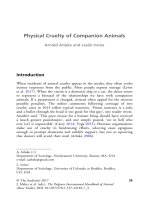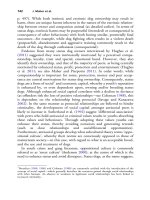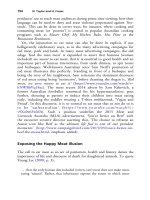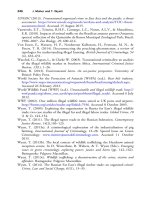The palgrave international handbook of a 283
Bạn đang xem bản rút gọn của tài liệu. Xem và tải ngay bản đầy đủ của tài liệu tại đây (27.57 KB, 1 trang )
280
K. Young
a de-civilizing process a civilizing spurt can be observed. In recent years, the
CHS has been granted increased access to behind-the-scene areas outside of
the public view and has made several recommendations to mitigate risks
associated with rodeo. The way these processes occur is influenced by broader
patterns of morality, ethics and tolerance in society manifested in all social
institutions.5 Where the Stampede is concerned, despite an evident growth
in public disdain over gruesome accidents as summarized above, the local
government and its provincial and federal counterparts have assumed a
largely passive posture. The Stampede Board, as previously demonstrated
the benefactor of millions of dollars in revenue from the rodeo and chucks,
has started to show signs of responding to public pressure with attempts to
increase safety and better manage risk to animals.
The Stampede’s shifting use of rationalizing strategies, or what sociologists
Sykes and Matza (1989) would call ‘techniques of neutralization’ can be
analyzed and explained through a further figurational lens. Dunning links
the civilizing process in sport with a process of what he calls ‘sportization’
whereby stricter rules and greater levels of supervision and surveillance of a
sporting environment are created, indeed necessary, for an activity to survive
in a wider process of growing sensitivity (1999, p. 48). Through the evolution in public sensibility, sport-related regulations and their supervision
become more efficient and surveilling:
A central part of this ‘sportization’ process involved the development of a stricter
framework of rules governing sporting competition. Thus rules became more
precise, more explicit and more differentiated while, at the same time, supervision of the observance of those rules became more efficient . . . (1999, p. 48).
The link between ‘sportization’ and the civilizing process is exemplified by the
fact that the level of tolerated violence in a sporting pursuit adjusts over time to
match the level of violence tolerated by the broader community. As society
becomes more repulsed by violence and its outcomes, the level of combative or
risky behaviour permitted in sporting events also decreases. Elias argues that
sports which are excessively violent by normal social standards are often
discredited as ‘illegitimate’ sports; in many ways this seems to be the growing
reputation of chuckwagon racing in some quarters. Why else would the
5
Such shifts co-exist with broader developments in philosophical debates on animal welfare/rights which
demonstrate notions of civilizing process and no doubt impact on welfare standards in the Stampede.
Arguably, there are similarities in the conflict between welfare and rights approach and the civilizing/decivilizing approach.









